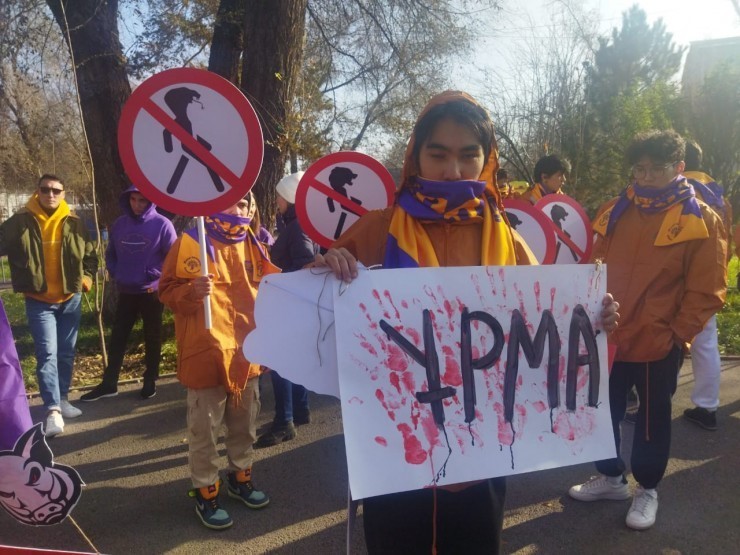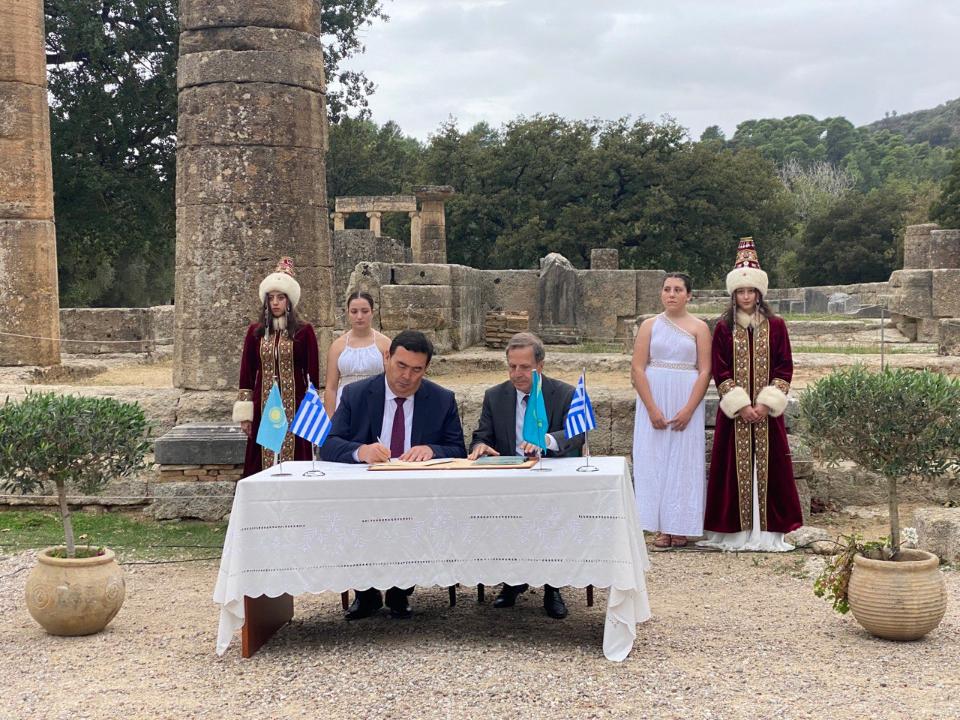Viewing results 271 - 276 of 274
Issues of modernizing water infrastructure and improving the water resources management system were discussed at a meeting of the Water Council of Kazakhstan chaired by Prime Minister, Alikhan Smailov, A post on the PM’s official website states. Minister of Water Resources and Irrigation, Nurzhan Nurzhigitov reported that Kazakhstan has 102.3 km3 of water, 54% of which is formed within the country, and the remaining 46% coming from neighboring countries. The annual consumption by economic sectors is about 25 km3 of water, of which 65% is used for agriculture, and 25% for industrial needs. To ensure the country's water security and solve the problem of shortages, a draft Comprehensive Plan for the Development of Water Resources for 2024-2030 has been developed. It provides for a number of urgent measures for the construction and reconstruction of reservoirs, and the reconstruction of hydraulic structures and irrigation systems. Implementation of the plan will increase available water resources by 3.7 cubic kilometers, and the area of irrigated land to 2.2 million hectares, as well as reduce annual losses of irrigation water by 3 cubic kilometers. In 2024-2026, it is planned to begin construction of 20 new reservoirs with a volume of 2.4 cubic kilometers in nine regions. This will increase the area of irrigated land by 250,000 hectares and reduce Kazakhstan’s dependence on neighboring countries for its water supply by an average of 25%. “We must annually introduce water-saving technologies on 150,000 hectares of irrigated lands. Now, implementation is carried out on 40-50,000 hectares per year. At the same time, in the southern regions where there is the greatest water shortage, the volume of implementation is the smallest,” said Smailov.
A very public tragedy in Kazakhstan put on display domestic violence at its worst. A quarrel in a restaurant in Astana on the evening of November 8th is reported to have resulted in the death of Saltanat Nukenova, the 31-year-old wife of Kuandyk Bishimbayev. Bishimbayev, who served as Minister of National Economy under former President Nazarbayev, was detained on the same day for suspected murder and remains under arrest awaiting trial. On November 11th, Saltanat was buried in Pavlodar. This appalling incident highlighted the urgent need for stronger protections against domestic violence. An authorized rally was held in Almaty in late November. Around 200 participants came out onto the square behind the Sary Arka cinema, holding posters and chanting slogans against domestic violence. The event was organized by a public movement called Zhana Adamdar and the attendees mostly included young people and students from the movement. Relatives of Saltanat Nukenova also took part. The participants wanted to raise awareness about fighting any manifestation of violence against women and children. Most of the attendees were dressed in the same style, and many of them had scarves with the inscription “Say no to the animal world,” which was also the title of the rally. Speakers at the event detailed the most resonant cases of violence in recent times while the organizers of the rally held a small flash mob and arranged an installation with mannequins in cages with animal masks on them. A minute of silence was observed in honour those who died as a result of violence. Progress in protecting women What proceeded this public tragedy hopefully presents a silver lining. A month later, on December 8, Kazakhstan's current President Kassym-Jomart Tokayev signed a Decree to strengthen human rights with concrete steps towards preventing violence and promoting gender equality. The Decree instructs Kazakhstan’s government to take systematic measures to promote equal rights and opportunities in all spheres of society, as well as to overcome all forms and manifestations of gender discrimination. The decree also encompasses legislation to deter domestic violence and promotes equal rights and safety for both men and women in the Republic of Kazakhstan, as endorsed by UN Security Council resolution 13251. It further involves legislative measures to tighten criminal liability in cases of domestic violence, which have now been implemented. These measures aim to hold perpetrators accountable and ensure that victims can get justice. Additionally, offenders of domestic violence may be required to undergo comprehensive psychological correction as part of their rehabilitation process. The Decree also asks for creating specialized units within the Ministry of Internal Affairs staffed with female officers, who can enhance the effectiveness of combating domestic violence. While the timing of the Decree coincided with the aftermath of Saltanat’s death, there are signs that these steps may have already been in the works. President Tokayev had voiced concerns about domestic violence before the current headlines emerged. At a meeting in the Ministry of Internal Affairs in June 2023, for example, he had affirmed that “comprehensive...
New charges of money laundering and taking a bribe have been levelled at the imprisoned former chief of Kazakhstan’s National Security Committee (KNB), Karim Massimov. On November 14th, the KNB's press service said that Massimov is currently in a pretrial detention center in Astana awaiting trial on the new charges. No further details regarding the charges were provided. In April, Massimov, a close ally of former President Nursultan Nazarbayev, was sentenced to 18 years over his role in the deadly events which followed unprecedented anti-government protests in January 2022. His deputies, Anuar Sadyqulov and Daulet Erghozhin, were sentenced to 16 years and 15 years in prison in respectively. A court in Astana found all three men guilty of high treason, attempting to seize power by force, and the abuse of their offices and power. Another former deputy of Massimov, Marat Osipov, was sentenced to three years in prison on a charge of abuse of office at the same trial. Massimov's first deputy, Samat Abish, a nephew of Nazarbayev, was dismissed from his post, but did not face any charges. The 58-year-old Massimov was arrested days after the initially peaceful protests turned into widespread violent unrest and coordinated attacks on government installations which left at least 238 people, including 19 law enforcement officers, dead. The protests began in the southwestern town of Zhanaozen early January 2022 over a sudden hike in the price of fuel, before demonstrations quickly spread into broader unrest against corruption, and perceived injustice.
On November 4th, a historically significant twinning ceremony was held between the city of Taraz in Kazakhstan and Ancient Olympia in Greece. The agreement was signed at the Temple of Hera, an ancient site revered by the Greeks. It's here that the rules of the original Olympic Games were kept, and where the Olympic Flame is ceremonially lit every two years, symbolizing the continuation of an ancient sporting tradition. Bakhytzhan Orynbekov, the Akim (Mayor) of Taraz, views this partnership as an opportunity to foster mutual growth. He believes that it will enhance exchanges in various sectors, including culture, sports, tourism, science, and education. These fields are seen as key areas of development that can benefit from international cooperation. Georgios Georgiopoulos, the Mayor of Ancient Olympia, echoed these sentiments. He expressed enthusiasm about forming bonds of friendship and brotherhood with Taraz. With a rich history stretching back 2000 years, Taraz has been a significant cultural crossroads between the East and West. This makes it an ideal partner for Ancient Olympia, which itself has a storied history dating back to antiquity. In a meeting with representatives from Ilia's business community, both parties agreed to strengthen economic ties and cultivate relations between their respective regions and business circles. This agreement underscores the importance of international collaboration in fostering economic growth and development. Ancient Olympia is renowned for its UNESCO World Heritage Sites and also for hosting the International Olympic Academy. This institution is the primary educational and cultural arm of the International Olympic Committee and plays a vital role in promoting the values and ideals of the Olympic movement. The initiative to twin Taraz and Ancient Olympia was spearheaded by the Embassy of Kazakhstan in Greece and the Kazakh-Hellenic Business Council, demonstrating the importance of diplomatic and business relations in fostering cultural ties.




